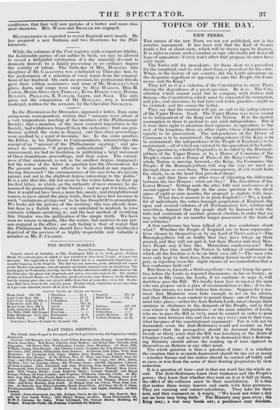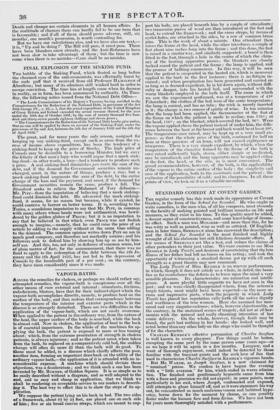TOPICS OF THE DAY.
THE names of the new Peers are not yet published, nor is the number 'announced. It has been said that the Earl of SCARY
heads a list of about sixty, which will be drawn upon by degrees. It is right to create such a number as may effectually put down all hope of opposition: if sixty won't effect that purpose, we must have sixty more.
The Tories call for precedents : let them show us a precedent for the complaint, and we will show them a precedent for the cure. When, in the history of our country, did the Lords adventure on the desperate expedient of opposing at once the People, the Com- mons, and the King? They tell us it is a violation of the Constitution to create Peers during the dependence of a great question. Be it so. The Con- stitution which cannot exist but in company with Gatton and Sarum—the Constitution which must be supported by corruption, and jobs, and sinecures, by bad laws and worse practice—ought to be violated; and the sooner the better.
They say that the creation will put an end to the independence of the Upper House. Good. The Upper House was never meant
to be independent of the King and the Nation. It is the merest assumption in them to pretend to any such independence. But if it were their right to maintain their opinions in opposition to the rest of the kingdom, there are other rights whose independence is equally to be guaranteed. The independence of the House of Commons is to be maintained; the independence of the King is to be maintained; the independence of the People of England is to be maintained,—all of which are violated by the opposition of the Lords. The question is, whether England is to be ruled by the Borough- jobbers of the Upper House, or by a House of Commons of the People's choice and a House of Peers of' the King's choice? The whole Nation is moving forward,—the King, the Commons, the People: if the Borough-jobbers will stop the vay, we must go through them or over them. The consequences, if evil result from the shock, be on the head that provoked them!
It is said that there are other ways of adjusting the difference between the two Houses : what are they The dissolution of the Lower House? Setting aside the utter fully and uselessness of a second appeal to the People on the same question in the short space of eight or nine months, the proposal is replete with inso- lence. What does it amount to in plain English:—" We, a hand- ful of individuals, the rotten-borough proprietors of England, the open and avowed violators of all Parliamentary law, written and unwritten, demand that the people shall be harassed with the riots and confusions of another general election, in order that we may be indulged in six months' longer possession of the fruits of our robberies."
A free conference has been talked of: a free conference about what? Whether the People of England are to have representa- tives chosen by themselves or by my Lord of NEWCASTLE ?—The Borough-jobbers tell us boldly that they have taken up their ground, and they will not quit it, but their Master and their Mas- ter's People may if they like. Miraculous condescension ! But who are they who insult the Nation by talking of conferences in which all the freedom is to be on their own sick ?—The men who were only kept by their fears from adding formal insult to real in- jury, in rejecting even the slight chance of accommodation that a free conference held out !
But there is, forsooth, a third expedient—we may bring the ques- tion before the Lords in repeated discussions: in fen or twenty, or at most in fifty years, the Lords, if we continue to urge it, will doubtless pass the Bill. We hardly know bow to answer the man who can propose such a plan of accommodation as this ; if we be- lieve him sincere, we must believe him insane. Suppose for a mo- ment that Ministers were fools enough to act on his advice, and their Master were content to permit them : one of two things must take place,—either the Anti-Reform Lords must change their opinions in obedience to the demands of the People, and in that case where is their independence ? or the seine number of Lords, who are to pass the Bill in 1832, must be created in order to pass it some time between this and (let us say) 1852: and in that case, what becomes of the constitutional argument? -For it will not be demanded—even the Anti-Reformers would not venture on that proposal—that the prerogative should lie dormant during the twenty or thirty years that the Bill was knocking at the doors of Climber Castle; and as little will it be demanded that a Reform- ing Ministry should advise the sending up of men opposed to themselves on Reform or any other point.
The whole question is thus a question of time; it is whether the creation that is so much deprecated should be one act or many —whether Sarum and her sisters should be carried off boldly and at once, or won from the arms of their doating proprietors by slow seduction.
It is a question of time—and in that one word lies the whole se- cret. The Anti-Reformers know their weakness and the People's power they know that whether they rush on it or it fall on them, the effect of the collision must be their annihilation. It is this that makes them. weary ..heaven and earth with false pretences. They are cunning and correct calculators. They take for their text, and they comment on it wisely., -" We know not what a day nor an hour may bring forth." The Ministry may pass away ; the King may; a war may break out; a pestilence may desolate. Death and change are certain elements in all human affairs. In the multitude of chances there can hardly fail to be one turn that is favourable; and if all of them should prove adverse, still, six months', one month's possession, is worth contending for. But we have our calculations also, and we have also our text,— it is, "Up and be doing!" The Bill will pass, it must pass. There have been blunders enow already, and the Anti-Reformers have not been slow to take advantage of them; but the time is now come when there is no mistake—tlere shall be no mistake.



























 Previous page
Previous page